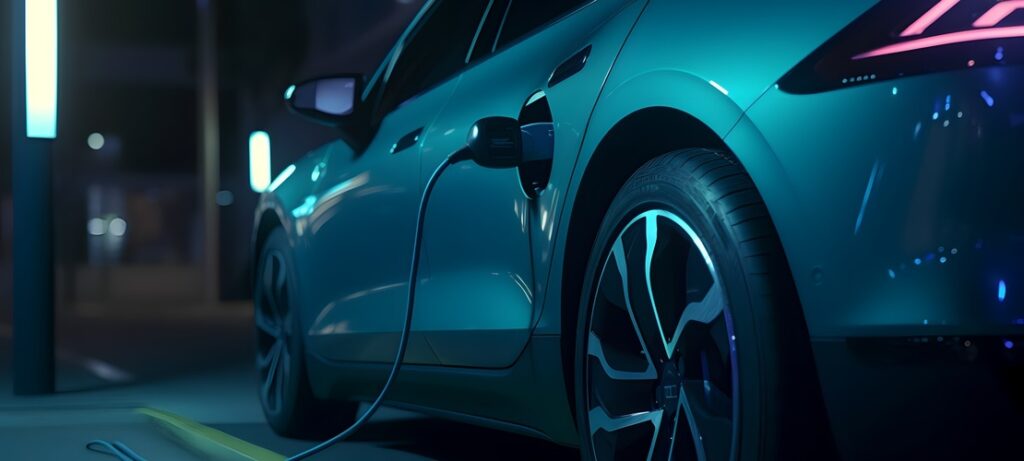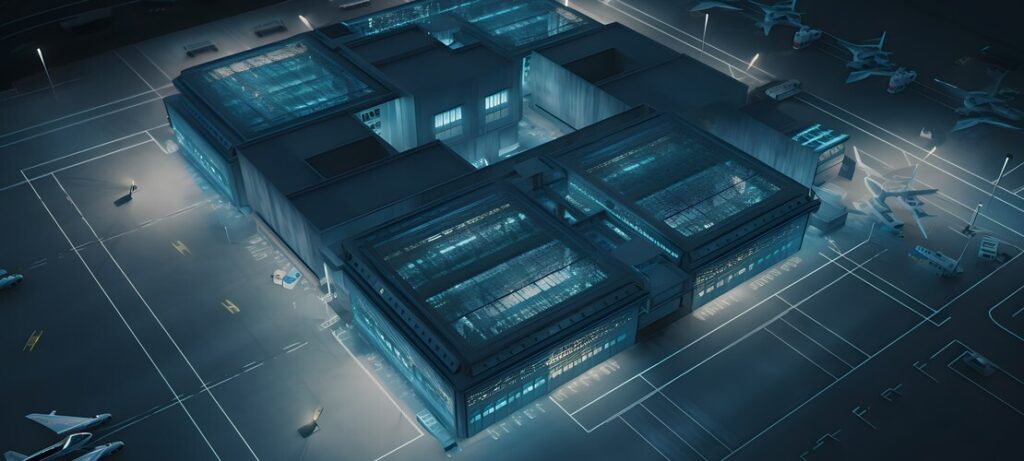Russell Vickers, CEO & Co-Founder at Future Mobility Campus Ireland, joins Builder Nation’s Podcast host Elisa Muñoz to share his experiences as a leader in the autonomous connected electric shared vehicles industry and the insights he has gained from his background in ASIC design.
This interview was brought to you by Builder Nation, the community of Hardware leaders developing world-changing products, and sponsored by ControlHub, the procurement software for hardware companies.
The automotive industry is one of the most significant and innovative industries in the world, with a rich history spanning over a century. From the early days of the Model T to modern electric and autonomous vehicles, the industry has continuously evolved to meet changing consumer demands and societal needs.
Companies like Future Mobility Campus Ireland play a crucial role in advancing the automotive industry by providing cutting-edge facilities, services, and expertise for testing and developing innovative mobility solutions.
This blog post will delve into the automotive industry, and Future Mobility Ireland’s role in promoting the development of Autonomous Connected Electric Shared Vehicles (ACES) and Connected and Autonomous Vehicles (CAV) industries.
Automotive Industry
The automotive industry plays a critical role in the global economy, providing employment to millions of people and contributing to the growth of various industries, such as manufacturing, technology, and energy. The sector also offers essential transportation services for people and goods, enabling economic and social development.
The industry’s history dates back to the late 19th century with the development of the first gasoline-powered automobile. Since then, the industry has witnessed several milestones, such as mass car production, the introduction of the assembly line, and the development of new technologies like electric and autonomous vehicles.
Types of Vehicles in the Automotive Industry
The automotive industry produces several types of vehicles, including passenger, commercial, electric, hybrid, and autonomous vehicles. Passenger vehicles are used for personal transportation and come in different forms, such as sedans, SUVs, and sports cars. Commercial vehicles, such as trucks, vans, and buses, are designed for business purposes and vary in capacity and features.
Electric and hybrid vehicles use electric motors and batteries instead of gasoline or diesel engines, making them environmentally friendly and cost-efficient. Autonomous vehicles use advanced technologies like sensors, cameras, and AI algorithms to navigate roads and make driving decisions, with the potential to reduce accidents and increase transportation efficiency.
Each type of vehicle serves a different purpose and has unique features and benefits in the automotive industry.
Automotive Industry Trends
The automotive industry is constantly changing, and several trends are shaping its future. One of the most significant trends is the growing adoption of electric and hybrid vehicles, driven by environmental concerns and the need for sustainable transportation solutions.

Another trend is the rapid advancement of autonomous vehicle development, with several companies investing in research and development to bring self-driving cars to the market.

Shared mobility services, such as ride-sharing and car-sharing, are also becoming increasingly popular, providing consumers with cost-effective and convenient transportation solutions.

The industry is pressured to reduce its environmental impact and adopt sustainable practices, such as using alternative fuels and reducing emissions. Technological advancements, such as connected cars and smart cities, also transform how people use and interact with vehicles.
These trends are shaping the future of the automotive industry and presenting opportunities and challenges for industry players. Companies that embrace these trends and adapt to the changing market conditions will be better positioned for success in the future.
Autonomous Connected Electric Shared Vehicles (ACES)
Autonomous Connected Electric Shared Vehicles (ACES) refers to the development and integration of self-driving, electric vehicles that are connected to the internet and designed for shared use. These vehicles are equipped with advanced technology such as sensors, cameras, and artificial intelligence (AI) algorithms, which enable them to navigate roads, communicate with other vehicles, and make driving decisions. ACES are seen as a way to improve transportation efficiency, reduce traffic congestion, and minimize environmental impact.
Connected and Autonomous Vehicles (CAV)
Connected and Autonomous Vehicles (CAV) refers to developing self-driving cars and integrating advanced technologies such as sensors, cameras, and AI algorithms to navigate roads and make driving decisions. CAVs can revolutionize the transportation industry by reducing accidents, increasing mobility, and improving transportation efficiency. This class vehicle involves research, development, testing, and deploying CAVs in real-world scenarios.
Future Mobility Campus Ireland
Future Mobility Campus Ireland (FMCI) is an organization that focuses on promoting Ireland’s ACES (Autonomous, Connected, Electric, Shared) and CAV (Connected and Autonomous Vehicles) industries. FMCI was founded to create and deliver future mobility testbed facilities, which stimulate research, development, and innovation in these areas.
FMCI offers several testbed facilities and services, including an Advanced Air Mobility Hub and a Land Mobility Testbed. These testbeds provide a platform for researchers to test and develop new technologies and offer valuable insights into the future of mobility in Ireland.
Advanced Air Mobility Hub
The Advanced Air Mobility Hub at FMCI is designed to target the growing market of Advanced Aerial Mobility (AAM), offering a range of testing and operational services for the industry. There are many synergies between air mobility and road mobility, and teh company aims to capitalize on this by working with industry and research partners to develop products for the future of transportation.

The Drone Port at FMCI is designed to be scalable and mobile, offering a flight operations center and a mobile unit to allow for flexibility in off-site testing. The flight operations center is based on a modular container equipped with the necessary radio and communications equipment to ensure flight safety. This innovative setup provides a unique opportunity for companies to test and develop their aerial mobility solutions in a controlled environment.
FMCI’s open testbed spans over 4km of public road network in the Shannon Industrial Estate, and is equipped with multiple sensors, CCTV, a set of traffic lights, and high-accuracy location systems, all connected to a dedicated data center. This provides a realistic and controlled environment for companies to test and validate their mobility innovations in real-world conditions.
FMCI’s Data Centre and Control Room provide customers with access to advanced control room capabilities, allowing for insightful and data-driven monitoring and visual analytics of mobility data. The control room is equipped with an Audio-Visual system for real-time monitoring of the testbed, providing valuable insights for customers in real-time.
In the main building of Future Mobility Campus Ireland, customers can avail of private and secure workshop bays with fast speed broadband, private virtual network, facial recognition access control, and other necessary amenities. Customers are also offered access to a private or common laboratory for any hardware works or testing needs. This creates a supportive and collaborative environment for customers to develop and enhance their mobility innovations.
Overall, the Advanced Air Mobility Hub at FMCI provides a unique opportunity for companies to test and develop their aerial mobility solutions in a controlled and realistic environment. With the combined facilities of the Drone Port, open testbed, data center, control room, and workshops and laboratories, FMCI offers a complete development center and full-scale test bed for future mobility.
Land Mobility Testbed
Future Mobility Campus Ireland offers a cutting-edge Land Mobility test facility, allowing individuals and companies to test and improve their innovations in real-world settings. Customers have access to a retrofitted fleet, which includes a Jaguar I-Pace and a Land Rover Defender, equipped with state-of-the-art sensing and data processing technology to optimize mobility solutions.
The Land Mobility test facility includes a road network retrofitted with interconnected sensing and telecommunication technologies. The open testbed spans over 4km of public road network within the Shannon Industrial Estate, equipped with multiple sensors, CCTV, traffic lights, and high-accuracy location systems. All facilities are fully accessible and controlled via a dedicated control center, providing customers with advanced monitoring capabilities and insightful, data-driven visual analytics of mobility data.
Private and secure workshop bays are also offered at the headquarters with all relevant services, including high-speed broadband, a private virtual network, and secure facial recognition access control. Customers have access to private or common laboratories for any hardware works, and advanced audio-visual systems for real-time monitoring of the testbed.
By utilizing the Land Mobility testbed, customers benefit from real-world testing and validation of their solutions, ensuring that their innovations are reliable, safe, and efficient. Future Mobility Campus Ireland is committed to advancing the future of mobility and providing customers with the necessary tools and resources to succeed in this rapidly evolving industry.
Future of the Automotive Industry
The future of the automotive industry is full of exciting possibilities as it continues to adapt to new technologies and consumer needs. With the development of ACES and CAV technologies, such as electric and hybrid vehicles and autonomous driving, the industry is rapidly changing.
The industry will continue to prioritize sustainability, connectivity, and autonomous technologies. Companies that focus on developing sustainable solutions will likely see increased demand, while those investing in connected and autonomous vehicle technologies will be better positioned to meet the growing demand for these features.
This evolution has the potential to greatly impact society and the environment, with electric vehicles reducing emissions and self-driving cars improving safety. Industry players must stay informed and be proactive in addressing these trends to remain competitive and meet the evolving needs of consumers.
